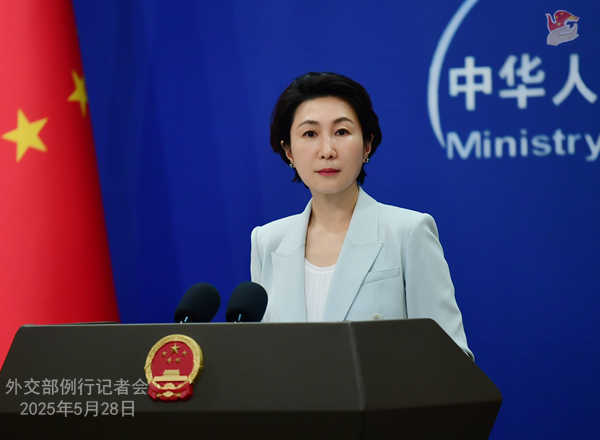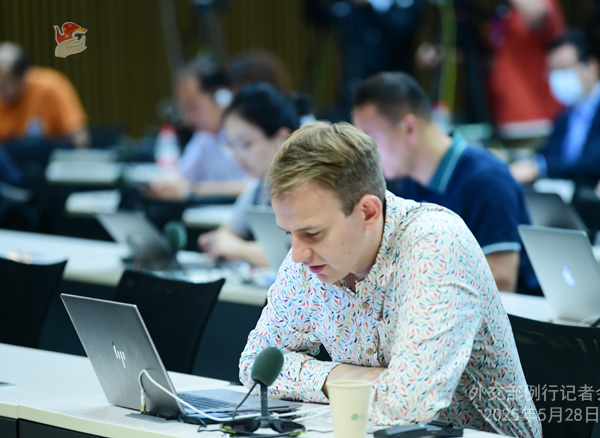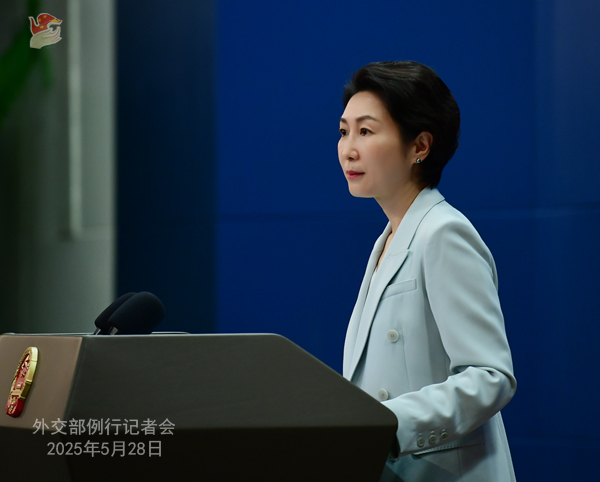
People’s Republic of China


CCTV: Yesterday, Premier Li Qiang attended the ASEAN-China-GCC Summit. Could you share more details? In the current landscape, what’s the significance of greater ties and cooperation between China, ASEAN, and GCC member states?
Mao Ning: Yesterday afternoon, Premier Li Qiang attended the ASEAN-China-GCC Summit in Kuala Lumpur, Malaysia, which is themed “Synergizing Economic Opportunities Toward Shared Prosperity.”
In his remarks, Premier Li Qiang said that China, ASEAN and GCC countries have a long history of friendly interactions. Today, against a volatile international landscape and sluggish global growth, the establishment of the ASEAN-China-GCC Summit creates a platform for exchanges and a mechanism for cooperation. It is a groundbreaking initiative in regional economic cooperation. By enhancing connectivity and cooperation, the three sides can foster a vibrant economic circle and growth pole, which is highly important both to our respective economic prosperity and to peace and development in Asia and the world. The three sides should firmly seize this historic opportunity to enrich the trilateral cooperation, and set a fine example of opening up across regions, of cooperation across development stages, and of inter-civilization integration.
China is ready to work with ASEAN and the GCC to strengthen trilateral partnership, discuss a trilateral action plan on high-quality Belt and Road cooperation, enhance synergy and connectivity, expand cooperation in various fields, and promote travels and people-to-people bond. The three sides should step up communication and coordination in multilateral mechanisms including the United Nations, defend the common interests of developing countries, categorically oppose hegemonism and power politics, and make global governance more just and equitable.
The summit adopted a joint statement between China, ASEAN, and the GCC.
Reuters: Japan’s military has reported that the Liaoning aircraft carrier group has sailed past the southern Japanese islands and is heading into the Western Pacific and that Japan is keeping a close watch. May I ask why are the carriers sailing so close to Japan, and is China sending a message to Japan, the United States and Taiwan?
Mao Ning: I’d refer you to competent authorities for specifics. What I can tell you is that China’s military vessels’ activities in relevant waters are fully consistent with international law and international practice. We hope Japan will view this from an objective and reasonable perspective.
CCTV: At the ASEAN-China-GCC Summit, the three sides pledged to step up their partnership. They also held the ASEAN-China-GCC Economic Forum. Facing rising trade protectionism and increasing uncertainty in the world economy, what role will China play in advancing the trilateral economic cooperation?
Mao Ning: As Premier Li Qiang noted in his speech at the opening ceremony of the ASEAN-China-GCC Economic Forum, cooperation is the only right way to overcome common challenges. Given everything that is going on, opportunities can be created if we join hands to meet the challenges.
With its high-quality development, China will consistently inject new impetus into the trilateral cooperation. The Chinese economy has been growing steadily since the beginning of this year, showing the great stability of the Chinese economy. We’ve made clear that more proactive and effective macro policies will be implemented and we will continue to strengthen counter-cyclical adjustments and have the capability and confidence to maintain the steady and long-term development of the Chinese economy. We are increasingly placing our strategic priority on expanding domestic demand and strengthening domestic circulation with a view to enhancing the internal driving force of the Chinese economy. We will stay committed to expanding high-standard opening up and enable domestic and international circulations to reinforce each other, so that companies across the world, including those from ASEAN and GCC countries, can fully share in the opportunity of China’s development.

AFP: Secretary of State Marco Rubio has instructed U.S. embassies and consulates worldwide to stop granting any visas to foreign students. Has China talked with the U.S. on this through diplomatic channels? What’s your comment?
Mao Ning: We are following the current development. China believes that education cooperation and academic exchanges should not be disrupted. We urge the U.S. to protect the lawful and legitimate rights and interests of all international students, including those from China.
Beijing Youth Daily: We noted that during the 2025 Global Trade and Investment Promotion Summit in Beijing, President of the American Chamber of Commerce in China Michael Hart said that the tariff war is like a reality check, proving that China is an important market as well as supplier of goods for the U.S. J.P. Morgan and several other U.S. companies have expressed their willingness to continue to invest in China, further explore the Chinese market and take part in China’s growth and innovation. What is your comment?
Mao Ning: China-U.S. economic ties benefit both sides. Such cooperation between the world’s two largest economies has brought tangible benefit to businesses and consumers of both countries. After the China-U.S. economic and trade meeting in Geneva, orders from U.S. purchasers and cargo ship bookings between the two countries surged, testifying to the enormous two-way demand between China and the U.S.
Protectionism will lead nowhere. We welcome companies from all countries, including the U.S., to operate and develop in China, deepen cooperation with China, and jointly create more opportunities and a better future.
The Paper: We noted that during the ASEAN-China-GCC Summit, China announced the extension of its visa-free policy to four countries including Saudi Arabia on a trial basis. Can you give us more details?
Mao Ning: To further facilitate cross-border travel, China decided to include more countries in its visa waiver program and extend visa-free policy to ordinary passport holders from Saudi Arabia, Oman, Kuwait and Bahrain on a trial basis from June 9, 2025 to June 8, 2026. Ordinary passport holders from the above-mentioned four countries can be exempted from visa to enter China and stay for no more than 30 days for business, tourism, family/friends visit, exchange and transit purposes.
Other GCC member states—the United Arab Emirates and Qatar—also enjoy comprehensive mutual visa exemption with China starting from 2018. China has given visa-free status to all GCC countries. We welcome more friends from GCC countries to visit China anytime.
Bloomberg: The UK’s Ambassador to the U.S. in a comment yesterday said that the U.S. and its allies should forge a technology partnership and said, “There is nothing I fear more in this world than China winning the race for technological dominance.” Does the Foreign Ministry have a comment?
Mao Ning: China believes that only with opening up and cooperation can a better prospect for innovation and development be embraced. China attaches importance to international exchanges on sci-tech innovation. All countries should have access to the benefits of sci-tech innovation.




